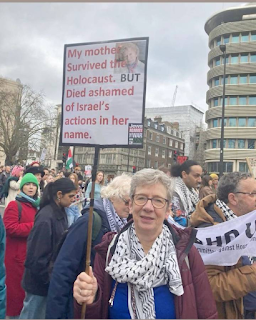We Do This 'Til We Free Us - Mariame Kaba's Special Book
WE DO THIS ‘TIL WE FREE US –
by: Mariame Kaba is a special book!1.
Prison-industrial complex abolition is a
political vision, a structural analysis of oppression, and a practical organizing
strategy. While some people might think
of abolition as primarily a negative project – “Let’s tear everything down
tomorrow and hope for the best” – PIC abolition is a vision of a restructured
society in a world where we have everything we need: food, shelter, education,
health, art, beauty, clean water, and more things that are foundational to our
personal community safety. (p.2)
Kaba describes something that is both very clear in
its vision, and also confusing in seeing as a new evolving reality. She tells us that we must:
1. Build
necessary radical societal changes which will require us to radically change
ourselves,
2. Learn
from revolutionary movements how to create collective less hierarchical, reducing
violence and harm,
3. Change
things so there is less contact between the criminal justice system and people,
and
4. Build
changes in our others systems dealing with education, capitalist exploitation
of workers, how we interact with people with disabilities and much more.
The book spends much detail describing how Black and
other BIPOC (People) are victimized and criminalized by the carceral prison system. Kaba notes how the various isms combine to trap
those we should be supporting.
The author aptly describes how we need to both ease
the burdens systemically oppressing helping free many, while not accepting reform
efforts that perpetuate the oppression.
Only radical change will help move us towards eventual equality and justice.
Kaba does not shy away from extremes in her
writing. She mentions the horrible
things that Dr. Larry Nassar did to many female gymnasts, while clearly stating
that punishing him through keeping him in jail for the rest of his life is 100%
wrong! She notes that she, herself, is
an abuse survivor, and that she needs to deal with her own desires for
revenge.
Kaba talks of the needs for the victims and survivors
to have their needs supported (including therapy). She tells us that those who hurt and kill need
to learn from their victims’ pain.
I don’t believe the state has the right to
kill in my name, any time ever. And then
something happens to a close friend of mine, and my feeling is they should kill
this person. (p.152-3)
…
And I also don’t think punishment is going
to get us there. And I also don’t think that using extreme violence ever
works. I think that’s just vengeance. (p.153)
I was killed by a visitor from a place
called Earth who couldn’t believe that there were no prisons in SP. Mine was the second murder ever in our
community, and it fell to my parents as chief peace-holders to ensure that the
harm caused was addressed. For days,
members of SP told stories about my life through tears, anger, and
laughter. There was, however, no talk
of punishment or vengeance. Neither
would bring me back. … After she killed
me, she turned herself in to my parents.
Her first words to them were: “Where will you put me?”
They responded in unison: “In circle.” And so it was that EV came to understand the
impact of her actions on an entire community.
And so it was that she experienced remorse for her actions and sought to
make amends. And so it was that my
community held EV in her humanity while seeking to hold her accountable for her
actions. (p.161)
While I very much appreciate this book, I’m left with
lingering doubts. Let’s presume, for
example that Dr. Larry Nassar was treated in a way, faintly, distantly related
to the imaginary world of SP. He
listened to his victims as well as others who loved them tell their stories of
the impacts of his abuse. They asked
him to acknowledge and atone for what he did.
If, he cooperated fully, I could easily imagine him
causing additional harm in similar or different ways. He did not learn to be who he was through a
brief process, and unlearning much of it would probably be a lifelong process,
similar to the alcoholic who needs to avoid all consumption of his poison. How would he be held accountable? While the current system, wouldn’t help him,
it also seemingly protects others from being victimized by him, as well as
helping most probably, survivors from feeling a present and future danger from
him.
Perhaps more problematic is my question, of what would
be done with him if he either denied what he did, or refused to cooperate in
some or all of the processes others tried to work out with him.
I don’t hear these issues being discussed in the book.
The book is (still) well worth reading!


Comments
Post a Comment